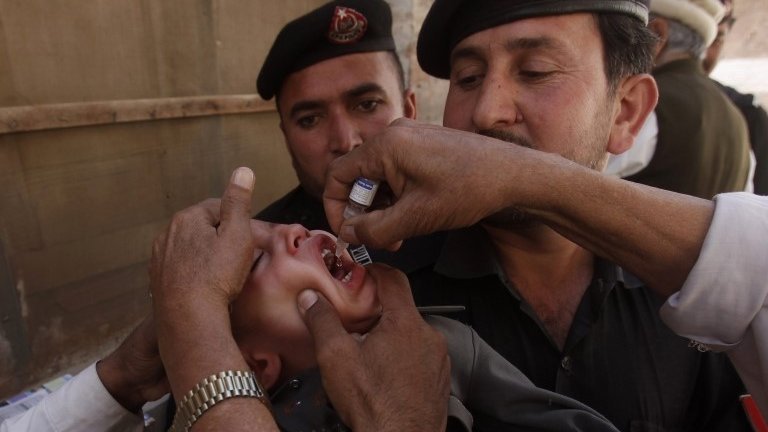Blogs
CIA Fake Vaccination Campaign in Pakistan
The U.S. Central Intelligence Agency (CIA) sabotaged Pakistan’s Public Health through the Fake Vaccination Campaign in 2011.

The U.S. Central Intelligence Agency (CIA) sabotaged Pakistan’s Public Health through the Fake Vaccination Campaign in 2011.
Pakistan is one of two remaining countries in the world where polio remains endemic, the other being Afghanistan. In the past, significant efforts have been made to combat the highly contagious and life-threatening disease. However, obstacles such as the lack of education, political instability and logistical challenges hindered progress.
In the early 2000s, organizations such as the WHO, UNICEF, the Bill & Melinda Gates Foundation, and thousands of healthcare workers on the ground offered hope for polio eradication. However, these efforts met resistance—eventually escalating into outright violence.
This resistance is not limited to polio vaccination programs only. In recent years, vaccination efforts for COVID-19, measles, and HPV have also been met with skepticism and suspicion in various parts of Pakistan. While some conspiracy theories may seem far-fetched or irrational, it would be unfair to dismiss all concerns as baseless. This deep-seated mistrust or fear has resulted in the deaths of dozens of healthcare workers and countless unvaccinated individuals, and the roots of this fear can be traced back to 2011 in Abbottabad, where the CIA played a pivotal role.
On the night of May 2, 2011, U.S. Navy SEALs raided a three-story compound in Abbottabad, Pakistan, where they located and killed Osama bin Laden. While the world celebrated this incident, it has had devastating consequences for Pakistan. Beyond the political implications, the operation that led to Bin Laden’s death may have indirectly caused the deaths of hundreds of thousands more
During the manhunt for Osama bin Laden, the CIA orchestrated a covert operation using a fake hepatitis vaccine campaign to illicitly collect blood samples of the residents in the neighbourhood where he was hiding. The goal was to match DNA samples with that of bin Laden’s sister, who had died in Boston in 2010.
The fake vaccination program ultimately failed; it led to the arrest of Shakil Afridi, a physician involved in the program and was widely criticized for undermining public health. The fake vaccination campaign not only deepened vaccine hesitancy in Pakistan but also fueled violence against healthcare workers, who were being perceived as spies. This breach of trust severely damaged public health efforts, led to the resurgence of polio in Pakistan and set back Pakistan’s public health efforts for decades
In December 2012, nine vaccination workers were murdered in Pakistan amid widespread conspiracies that polio vaccines were a Western plot to sterilize Pakistani girls. In response, the United Nations withdrew its vaccination teams from the country.
In 2013, legitimate healthcare workers along the Pakistan-Afghanistan border were chased away by villagers, accusing them of espionage. The Taliban subsequently banned polio vaccinations in certain parts of Pakistan, citing the CIA’s deception as justification.
In another incident, an anti-polio vaccination campaign was abruptly halted due to conspiracy theories, resulting in the deaths of two policemen and one health worker.
In another instance, panic over unfounded rumours—claiming that the polio vaccine caused fainting and vomiting—led over 25,000 children to be rushed to hospitals.
In a separate occurrence, angry protesters burned down a healthcare facility in Khyber Pakhtunkhwa (KP).
In just one week, “at least 700,000 families refused vaccination in the Khyber Pakhtunkhwa province alone”. Overall, at least 35 healthcare workers have been killed during their vaccination attempts in Pakistan, with damage in terms of unvaccinated children being innumerable.
In 2011, Doctors Without Borders condemned the program. In February 2012, the non-governmental organization InterAction also denounced it. On January 6, 2013, the deans of twelve American public health schools sent a letter to President Obama, strongly criticizing the operation.
CIA Vaccination Campaign in Pakistan: A Global Setback
The timing of these attacks could not have been worse. The global fight against polio had reached its final stages, with cases dropping from 350,000 in 1988 to just 650 in 2011. At its peak, the disease had been endemic in 125 countries. By 2011, only three countries—Afghanistan, Pakistan, and Nigeria—remained polio hotspots.
However, the CIA’s reckless operation may have set back polio eradication efforts by at least 20 years. leading to 100,000 more cases that might otherwise not have occurred, says Leslie F. Roberts of Columbia University’s Mailman School of Public Health. “Forevermore, people would say this disease, this crippled child is because the U.S. was so crazy to get Osama bin Laden,” he remarked.
Forevermore, people would say this disease, this crippled is because the U.S. was so crazy to get Osama bin Laden
CIA Vaccination Campaign in Pakistan: A Breach of Moral Ethic
The fake vaccination drive was not just a strategic blunder—it was a profound ethical violation. Physicians take the Hippocratic Oath to do no harm. Humanitarian workers are bound by an international code of conduct that demands their services be provided solely on the basis of need, without political or military agendas.
The CIA’s operation in Pakistan ignored these principles entirely. The sham vaccination drive began in a poor neighbourhood of Abbottabad, likely to make it appear more authentic. However, after administering just the first dose of a standard three-dose hepatitis B vaccine, the team abruptly moved to bin Laden’s wealthier neighbourhood—exposing their true intent. The well-being of patients was never a priority; deception was the only objective.
A red line must be drawn between humanitarian efforts and military operations, no matter how unconventional warfare becomes. The consequences of weaponizing public health are too great—undermining future health initiatives, jeopardizing global health security, and fueling instability.
This was not just bad medicine; it was bad spycraft. A wiser leader would have recognized the risks and disavowed such reckless tactics.




